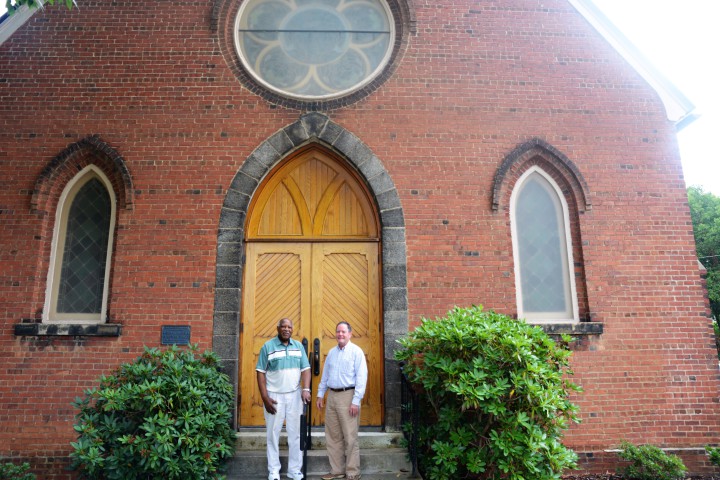
At a time when the nation is reeling from racially fueled violence and grieving the losses of young African-American men and five Dallas police officers, a small haven of racial love, respect and understanding in downtown Asheville is gearing up to celebrate its success with a 150th birthday party (see box, “If You Go”).
“We all agree to be ourselves and to love each other,” says Barbara Jones, the first woman to serve as senior warden at St. Matthias Episcopal Church. “We talk to each other about things that aren’t comfortable.”
“We also do diversity training,” says church member Dodie King. “We work at it.”
The venerable institution was founded in 1865 as the Freedmen’s Church. In the course of doing historical research, says St. Matthias member Diane Mance, they discovered that it was founded two years earlier than they’d thought, but “We decided to celebrate anyway.”
Believed to be the oldest African-American congregation in Asheville, it was renamed Trinity Chapel in 1872 and became St. Matthias in 1894, when construction of the current brick structure was begun. In 1870, the church founded the city’s first school for African-Americans.
Former slave owners (and Confederate officers) Thomas Patton and James Martin and their wives helped found the Freedmen’s Church, in cooperation with Trinity Episcopal Church. Patton donated the land on Dundee Street where the brick building stands today, overlooking downtown and with a view of the Black Mountains in the distance.
Patton wanted the church to have an African-American priest, says the Rev. Jim Abbott, who retired as rector in 2011, but “He couldn’t get anyone ordained here, so he went north and recruited a priest.”
The church’s members have included such community leaders as Isaac Dickson and Francine Delany, both of whom have schools in Asheville named after them.
Another member, James Vester Miller, was born a slave. As a free man, he became a builder and constructed the municipal building that now houses the police and fire departments, the old post office and other public buildings and churches — including St. Matthias.
According to Abbott, after the 1993 Diocesan Convention, Ms. Pamela Hemphill, a member of the vestry of St. Stephen’s, Morganton, wrote Bishop Robert Johnson a letter protesting the lack of African-Americans in leadership positions in the diocese. That led to the formation of the Task Force on Racism And Cultural Issues. A few years later, the task force developed a training program called Dismantling Racism; still offered today, it’s been brought to various churches and schools.
“It started as a task force,” says Mance, who serves as head of St. Matthias’ Anniversary Celebration Planning Committee. “Later, when we decided it shouldn’t be temporary, we changed it to the Commission to Dismantle Racism.”
Still segregated
Nonetheless, more than two decades after the Rev. Martin Luther King Jr. called 11 a.m. on Sunday the most segregated hour of the week, St. Matthias — like most churches across the country — was still segregated. But that began to change 20 years ago, when Ron Lambe came to play the church organ.
“I was working at St. George’s then,” he says. “I would play for their two morning services and then come here and play for the 11 o’clock service. After two years here, I left St. George’s.”
Lambe didn’t even know the congregation was African-American until he walked through the door and fell in love with the building, its acoustics and its classic church organ. Lambe went on to become the congregation’s first white member.
St. Matthias wasn’t thriving at that point, says David Jones Jr., a church member for 65 years who retired as head of the Asheville Housing Authority in 2005. He began attending when he met his future wife, Barbara, a descendant of the founding families.
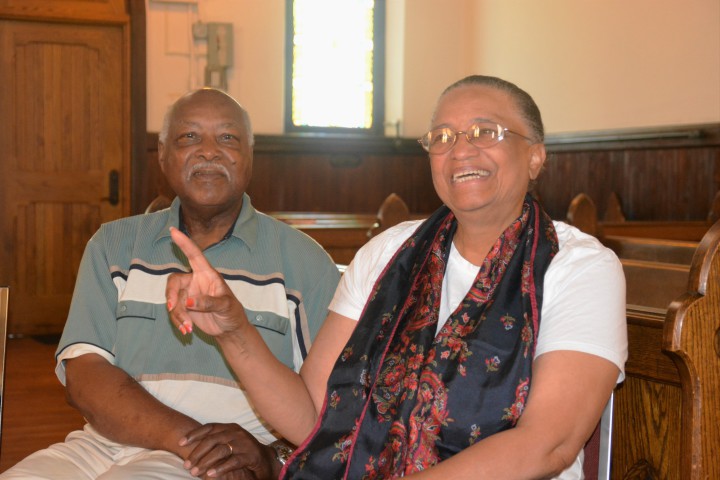
“We didn’t have a priest, and we were down to a few members who came on Sunday,” says Jones. “But we paid Ron’s salary, and we managed to keep the doors open.”
Other bills were looming, however: repairs to the roof and a diocesan assessment. Determined to keep the church from closing, Jones visited each family on the membership roll and asked for a pledge to meet the expenses. No one refused, though one woman wrote a check without pledging.
“I had to dip into some of my own money,” says Jones, “but we paid the bills.”
The next task was increasing membership even as the supply of priests to conduct Sunday services was running dry.
“The Lord told me this church had a future, and that I had to keep these doors open,” says Jones. “I told him I needed help, and I received all the tools I needed.”
He called his friend the Rev. David Sailer, then the rector of Calvary Episcopal Church in Fletcher, who gave him the phone numbers of a few priests who might be willing to serve one Sunday a month, when the church served Holy Communion.
“Suddenly we had a six-month supply,” says Jones. Later, Calvary Episcopal members came in to help repair the stained-glass windows.
A safe place
In the late 1990s, the congregation began having conversations about intentional diversity. Longtime member Bill Mance says people were invited to come, each bringing his or her own gifts. “The way it ends is groups like this, where everyone is equal and we are allowed to have difficult discussions. This is a safe place.”
In 1999, Abbot retired as rector of a church in Columbia, South Carolina, and moved to Asheville to be closer to his aging parents. “I knew I didn’t want to be CEO of a large church anymore,” he says. “I hadn’t really thought about full retirement, but I wanted to be closer to the ground, doing the real work.”
Abbott took on the part-time job of rector at St. Matthias and stayed 11 years. After that, the Rev. Gerald Prickett took the reins. Prickett was chaplain and taught English at Asheville School, but he wanted to serve as a parish priest. He approached the bishop and asked where he might serve. Soon afterward, the bishop called and asked whether he’d be interested in St. Matthias. He visited, met with some of the members and was invited to preach.
“I preached one Sunday, and I guess I got a C or a C-minus,” he says. “But they must have figured I would improve, because I’m still here.”
Today, the church that some thought was finished in the late 1990s is still standing and, after over 150 years, its members are still working to build a better community.
“God has a plan for St. Matthias,” says Jones. “It’s not by mistake that Jerry Prickett is here. He is part of God’s plan: We still have work to do.”
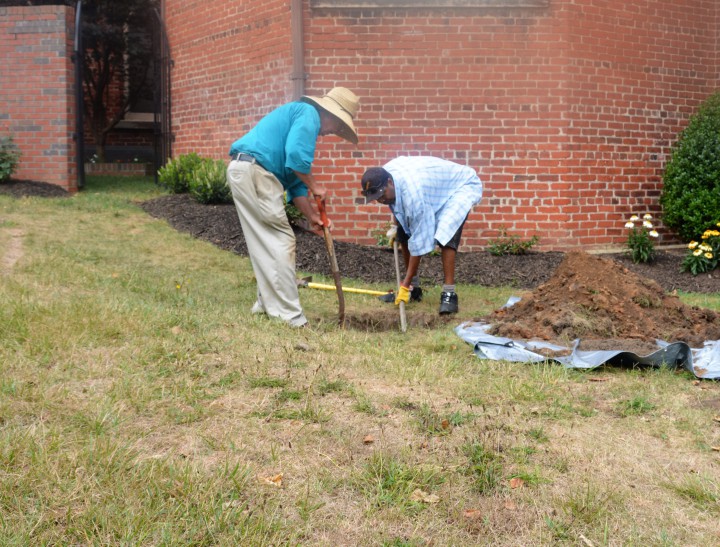
If you go
What: St. Matthias Episcopal Church 150th anniversary celebration
When: Saturday, July 23, 3 p.m.
Where: St. Matthias Church, 1 Dundee St., Asheville


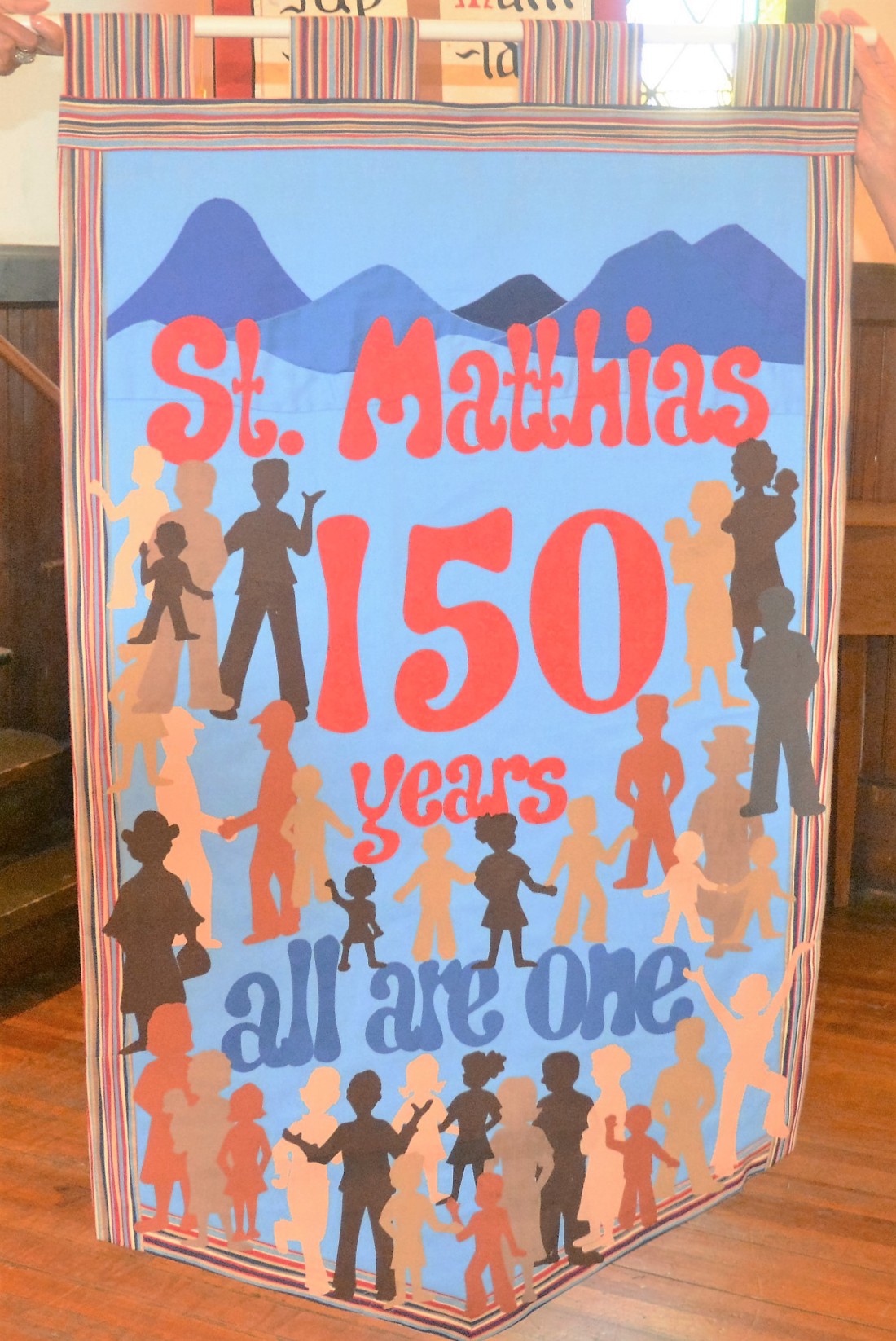
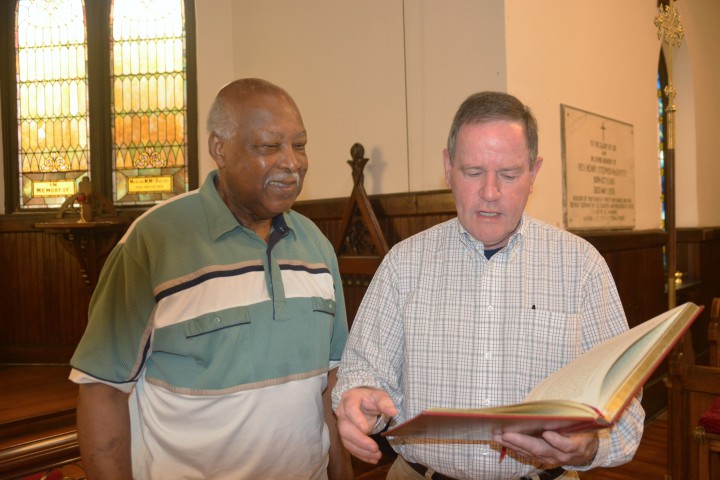
Before you comment
The comments section is here to provide a platform for civil dialogue on the issues we face together as a local community. Xpress is committed to offering this platform for all voices, but when the tone of the discussion gets nasty or strays off topic, we believe many people choose not to participate. Xpress editors are determined to moderate comments to ensure a constructive interchange is maintained. All comments judged not to be in keeping with the spirit of civil discourse will be removed and repeat violators will be banned. See here for our terms of service. Thank you for being part of this effort to promote respectful discussion.